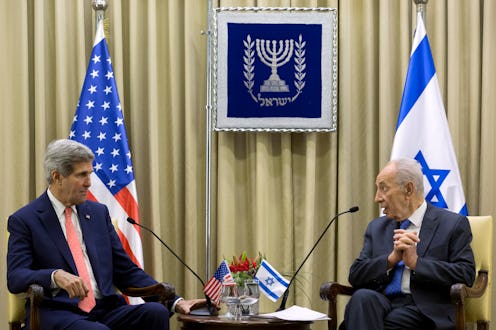News
Kerry Denounces 'Illegitimate' Israeli Settlements
U.S. Secretary of State John Kerry has some strong words for Israel: Settlement building in occupied territories is "illegitimate." After meeting with Israeli Prime Minister Benjamin Netanyahu and Palestinian President Mahmoud Abbas, Kerry urged Jewish settlers to cut back on their expansion. The tough love was the latest pass to reinvigorate Israeli-Palestinian peace talks, which have stymied in the last week due to an announcement that 3,500 new homes would be constructed in the occupied West Bank and East Jerusalem.
"Let me emphasize that the position of the United States is that we consider now, and have always considered, the settlements to be illegitimate," Kerry said. "I want to make it extremely clear that at no time did the Palestinians in any way agree, as a matter of going back to the talks, that they could somehow condone or accept the settlements."
The statement is rather audacious for a U.S. politician. "In the past the phrase has been that the Israeli settlements are 'not helpful'," Al Jazeera's Mike Hanna said.
Specific information has been difficult to obtain about the negotiations, which have been kept hidden from public view at secret locations. After Kerry's meeting with Netanyahu, the prime minister had some discouraging comments. "I am concerned about the progress because I see the Palestinians continuing with incitement, continuing to create artificial crises, continuing to avoid, run away from the historic decisions that are needed to make a genuine peace," Netanyahu said, standing next to Kerry.
Palestinian officials demand clear borders of a Palestinian state, negotiations on the future of Israeli settlements, and a release of 104 long-held inmates. This week, Israel announced the release of 26 Palestinian inmates. Palestine will not proceed with peace talks as long as the Jewish settlements keep growing, according to an anonymous Palestinian official.
Kerry seemed to side with Abbas, saying the Palestinian leader "wants to try peace and he understands it requires compromise by all the parties." Kerry also announced that Palestine will receive about $75 million from the United States to aid its economy.
The news today that former Palestinian leader Yasser Arafat was probably lethally poisoned in 2004 may also add a new layer of tension to the peace talks. Scientists found at least 18 times the normal levels of radioactive polonium in his body. "In terms of motive, the chief suspects would be Arafat’s Palestinian rivals or the Israeli government, his sworn enemy," Al Jazeera reports. But since the case is so old, it'd be difficult for authorities to pinpoint a culprit.
In the midst of peace talks with Palestine in early September, reports surfaced that Israel had conducted a missile test with the United States in the Mediterranean, potentially in preparation for a strike on Syria. Tensions over Syria put off a planned meeting between Kerry and Netanyahu. (Not to mention, just this week, peace talks on Syria itself in Geneva were postponed. Not a great week for Kerry.)
Kerry helped jump-start peace talks after three years in July, and he wants an agreement in nine months. (Good luck with that, buddy.)
